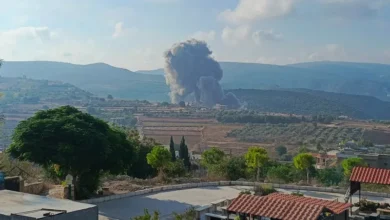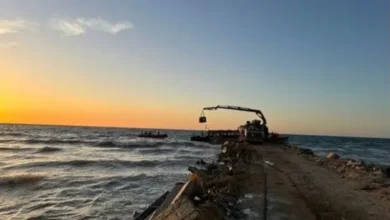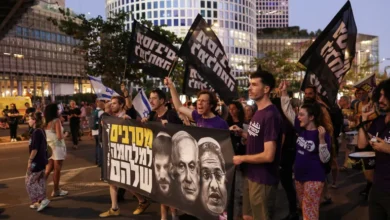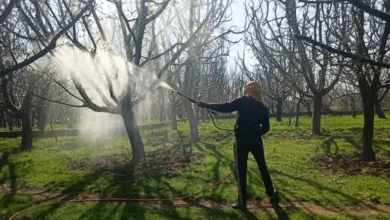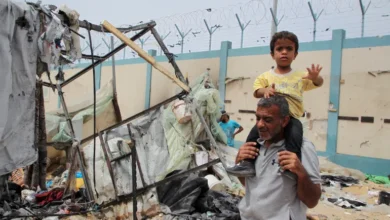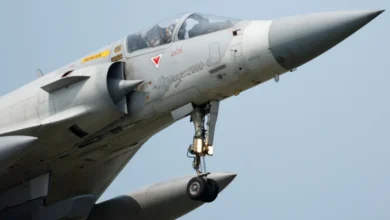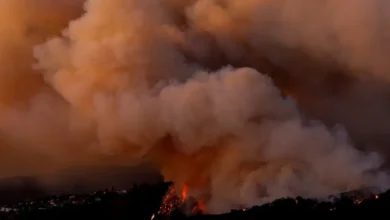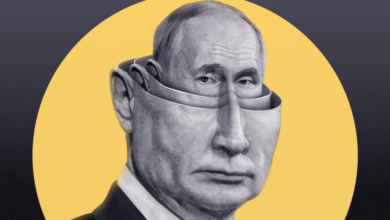Hezbollah weapons arsenal, underground network a ‘huge threat’ to Israel: Experts
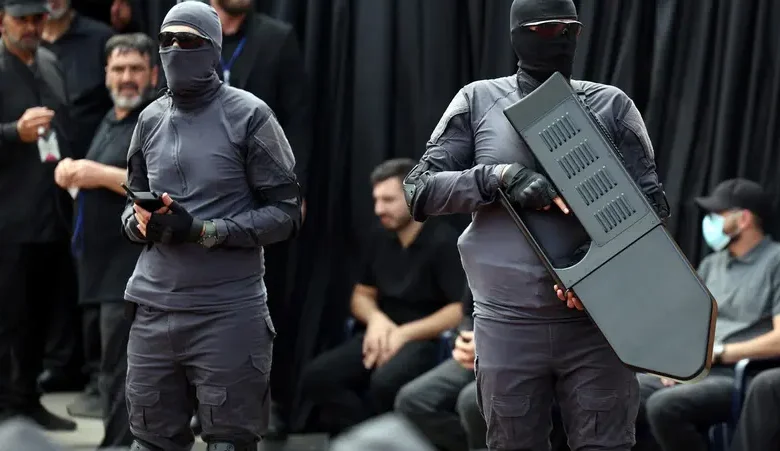
With its massive underground tunnels network and a vast weapons arsenal, Lebanon’s armed Hezbollah group poses a “huge threat” to Israel, despite the Mossad’s notoriously sophisticated intelligence tactics, experts have said.
On Monday, Israel expanded its airstrikes on what it said were Hezbollah targets in Lebanon’s southern and eastern regions. The armed group on Wednesday announced that it had launched a rocket aimed at what it claimed was the Mossad spy agency’s headquarters near Tel Aviv. The group accused Mossad of orchestrating the assassinations of its leaders and sabotaging communication equipment used by its members following the mass pager and walkie-talkie explosions across Lebanon last week.

These incidents have marked a significant escalation in tensions between the two long-time adversaries, heightening concerns that the nearly year-long conflict could escalate further, threatening stability in the broader Middle East, where the war between Hamas and Israel is already raging in Gaza.
Boaz Shapira, a researcher at Alma, an Israeli think tank that specializes in Hezbollah, told Al Arabiya English that, Israel hasn’t yet targeted most of Hezbollah’s strategic arrays.
“This includes long-range rockets, precision-guided missiles, UAVs, cruise missiles, anti-aircraft systems, anti-ship missiles and so on,” Shapira said. “Also, Israel hasn’t carried out significant attacks in Beirut against Hezbollah targets (there are a lot of long-range rockets, precision-guided missiles and headquarters). Additionally, most of the Hezbollah personnel targeted so far were from the military wing.”
Further escalation likely
Shapira said further escalation, however, is likely and “could include personnel from the ‘civilian’ branches such as Shura council members, members of parliament, people associated with Hezbollah banking, health and education systems, etc.”
Another possible escalation, he warned, could be the targeting of civilian infrastructure used by Hezbollah “such as the Beirut airport, seaports, power stations.”
According to Israel’s military on Tuesday, dozens of Hezbollah targets were hit during overnight operations. These strikes followed earlier air raids on the group that, according to Lebanese officials, killed at least 558 people and forced tens of thousands of others to flee their homes.
Shapira said it is clear from the “number of resources put into the Lebanese arena in the past two decades, which enabled Israel to gain unprecedented intelligence about Hezbollah” that Israel is not “underestimating” the threat of the armed group, which is considered one of the most heavily armed non-state militias in the world.
According to the researcher, while the Israeli army is following a specific plan, “Hezbollah poses a serious threat to Israel” and lot more need to be done to remove that threat.
“Every commander, headquarters, missile, rocket and UAV that is taken out now will make Israel’s position better in the future, whether it be a ground invasion or a diplomatic solution,” Shapira told Al Arabiya English.
“Less Hezbollah assets will pose fewer threats for Israeli civilians but will also make a ground maneuver easier.”
Matthew Savill, the director of military sciences at the Royal United Services Institute (RUSI), told Al Arabiya that he thinks “Israel is very much aware of the risk of under-estimating Hezbollah” given memories of the 2006 Lebanon War, and it “appears to have spent years building up a sophisticated intelligence collection and analysis machinery to try and map the totality of Hezbollah’s threat.”
“We can see this in the extent to which it was able to penetrate Hezbollah to conduct the ‘pagers’ attacks, and the speed with which it has targeted rocket launchers and missile storage sites, along with the sheer scale of airstrikes launched in the past four days alone. Nonetheless, Hezbollah’s arsenal is understood to be extensive, and much of it buried/stored away where it is much harder to attack (tough this doesn’t mean it is all usable, and still has to be exposed to be launched).”
Israel will have ‘surprises up its sleeve’

According to Shapira, it appears that Israel has prepared itself for a war with Hezbollah and likely has “more surprises up their sleeve,” including a ground invasion.
“[A ground invasion] is a very realistic option – although it seems that the US and other countries are very afraid of that scenario,” he said. “The main reason for a possible ground maneuver is that Hezbollah has stated over and over again that it would not stop attacking Israel as long as Israel is operating in Gaza.”
“Israel’s goal is to bring back home, safely, more than 60,000 civilians that had to leave their houses due to Hezbollah’s attacks starting from October 8. The threats Hezbollah poses are not something Israel can accept, and if Hezbollah does not remove these threats, Israel will have no choice but to do so itself.”
Savill believes Israel will try and reduce the need for a boots-on-the-ground invasion.
“I would have said that if the Israelis wanted to reduce the threat to northern Israel, a ground incursion was necessary (this wouldn’t be able to get ballistic and longer-range rockets, which can be launched from north of the Litani). But from the look of this current wave of airstrikes, they are trying to hit Hezbollah hard enough to reduce the need for operations on the ground – which would be hard and bloody, given Hezbollah’s preparations to fight as a guerilla force. The truth is, I don’t know.”
Lebanon’s ‘challenging’ terrain a threat

Shapira did also warn, however, that Hezbollah does have a strategic advantage in case of a ground invasion due to Lebanon’s “challenging” terrain which would post difficulties for any invading army.
“The terrain in Lebanon is very challenging. It is very mountainous, with thick vegetation and not very dense population like in Gaza,” said Shapira. “Also, the winter in Lebanon is another important factor. Another factor that needs considering is the amount of support Hezbollah gets from the Shia population in south Lebanon. The IDF estimates that one in every three houses is being used by Hezbollah.”
Hezbollah’s arsenal

With a suspected stash of rockets, mid-range missiles, long-range missiles, ballistic missiles and drones, “Hezbollah’s arsenal also poses serious threats to Israel,” said Shapira.
“It is very diverse; some of it is precise, and there are certain missiles, such as Scuds, with a range that covers all of Israel,” he added.
In the case of an all-out war with Hezbollah, he said it can be expected that the armed group will target cities, civilian infrastructure, energy facilities and infrastructure – such as power stations, gas rigs, and water desalination plants – to gain the upper hand.
But one of the main challenges posed by Hezbollah tactics is its use of human shields – much like Hamas is doing in Gaza – said Shapira.
“Hezbollah also places a lot of its weapons within residential areas, literally in houses where people live,” Shapira said, adding that some of these homes were targeted in the recent Israeli strikes.
Israel’s deterrence in ‘remission’

According to the director of the Middle East Program at the Center for Strategic and International Studies in Washington, DC, several members of Israel’s defense establishment feel “Israel’s deterrence has been in remission.”
In comments made this week, Jon B. Alterman said there are a lot of people in the Israeli defense establishment “who feel that it has been too long since Israel dealt Hezbollah a serious blow…They feel that Israel’s deterrence has been in remission because the state has been too measured in its response to Hezbollah’s shelling of communities in the north of Israel since October 7.”
He also described Hezbollah as an armed militia that is impervious to rule by the state.
“A lot of countries would consider it unacceptable if they had an armed militia across the border that was shelling an area and preventing tens of thousands of citizens from living there. From an Israeli perspective, if the government of Lebanon can’t control Hezbollah, then Israel will,” he said.
On global intervention to stop an all-out war, Alterman said, to the US, “diminishing Hezbollah’s capabilities is not a bad thing.” The challenge, rather is ensuring that this escalation does not tip the entire region into war.
According to expert, the US “will likely try to apply pressure on Israel in the next week” if the escalation stays within “manageable parameters.”
However, “from an Israeli perspective, they can act with relative impunity this week.”
“Looking toward the weekend, there will likely be a continued escalation in Israeli actions, although it is unlikely that the situation will tip into an all-out war before then.”
At the end of the day, according to Shapira, the situation is a “simple one.”
“On the one hand, you have a terrorist organization that is poised on destroying Israel and killing its civilians, and on the other hand, there is Israel trying to prevent that,” he told Al Arabiya English.
“Hezbollah and Iran took over Lebanon, taking its population hostage,” he added.
“They are taking advantage of the country’s poor condition to gain more power and take over it completely. Israel is not at war with Lebanon or the Lebanese population but with Hezbollah and Iran.”
“Hezbollah attacked Israel unprovoked on October 8th and since then, for more than 11 months, has kept on launching missiles and rockets toward Israel on a daily basis.”
Hezbollah has insisted it will not halt any cross-border attacks on Israel unless its war on Gaza comes to an end.
As a result of these cross-border attacks, Israel evacuated more than 60,000 people from their homes, said Shapira.
“They left their workplaces, schools and friends and are waiting for a solution for the situation that would ensure they can go back home and feel safe.”
“The simplest solution is that Hezbollah will accept UN resolution 1701 and withdraw north of the Litani river.”
ince Israel escalated its airstrikes on Monday on various areas of Lebanon in the south and east, thousands of citizens have been forcefully displaced.
